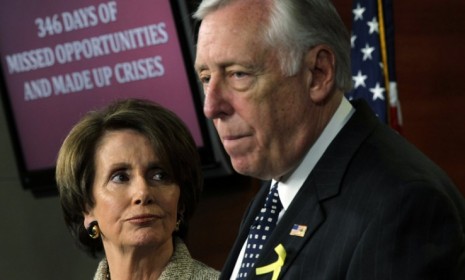The deal averting a government shutdown: Who achieved what?
Congress reached an 11th-hour deal to keep federal agencies running. But the horse-trading isn't over

Just 27 hours before a deadline that could have shut down the federal government at midnight Friday, Democrats and Republicans reached an agreement on a $1 trillion spending bill that will keep the lights on through the end of the fiscal year in September, 2012. They still have to work out the particulars of another sticking point — a separate measure extending a temporary payroll tax cut and jobless benefits. So what did both parties gain, and give up, to break the impasse? Here, a brief guide:
So, the parties settled their differences?
Not exactly. They still have to work out how to pay for the $120 billion payroll tax cut extension for 160 million workers, to keep it from expiring on Dec. 31. But they got close enough that the White House and Senate Democrats figured it was safe to detach the payroll-tax issue from the spending bill, which they were delaying in an attempt to force the GOP to negotiate. Now Congress can approve the spending bill, and focus on settling lingering differences over the payroll tax.
The Week
Escape your echo chamber. Get the facts behind the news, plus analysis from multiple perspectives.

Sign up for The Week's Free Newsletters
From our morning news briefing to a weekly Good News Newsletter, get the best of The Week delivered directly to your inbox.
From our morning news briefing to a weekly Good News Newsletter, get the best of The Week delivered directly to your inbox.
Who caved?
Both sides gave up a little on the spending measure. "The final bill strips out a Republican amendment to the Treasury budget to reinstate Bush-era restrictions on travel to Cuba" — something President Obama opposed, says David Rogers at Politico. But it also includes some GOP provisions that are hard for Democrats to swallow, such as one blocking new, greener standards for light bulbs.
Will extending the payroll tax be easy now?
Both sides say a deal is near, although anything can happen. Democrats have reportedly dropped their insistence on offsetting the cost with a surtax on people making more than $1 million a year, which was a dealbreaker for the GOP. But Republicans haven't budged on one provision Democrats have described as a poison pill — a controversial proposal to expedite the review of the Keystone XL oil pipeline.
A free daily email with the biggest news stories of the day – and the best features from TheWeek.com
What happens if they can't agree?
Both sides want to extend the payroll tax holiday. If they let it expire, the portion of Americans' paychecks withheld for Social Security and Medicare will rise 2 percent — from 4.2 percent to 6.2 percent. In such a scenario, someone making $50,000 would have to pay $1,000 more in payroll taxes. To avoid that, Congress is likely to pass a two-month extension if no long-term agreement is in sight. That way members will be able to head home for the holidays, and put off a final showdown until February.
Sources: CNN, NY Times, Politico, Washington Post
-
 Political cartoons for January 25
Political cartoons for January 25Cartoons Sunday's political cartoons include a hot economy, A.I. wisdom, and more
-
 Le Pen back in the dock: the trial that’s shaking France
Le Pen back in the dock: the trial that’s shaking FranceIn the Spotlight Appealing her four-year conviction for embezzlement, the Rassemblement National leader faces an uncertain political future, whatever the result
-
 The doctors’ strikes
The doctors’ strikesThe Explainer Resident doctors working for NHS England are currently voting on whether to go out on strike again this year
-
 The billionaires’ wealth tax: a catastrophe for California?
The billionaires’ wealth tax: a catastrophe for California?Talking Point Peter Thiel and Larry Page preparing to change state residency
-
 Bari Weiss’ ‘60 Minutes’ scandal is about more than one report
Bari Weiss’ ‘60 Minutes’ scandal is about more than one reportIN THE SPOTLIGHT By blocking an approved segment on a controversial prison holding US deportees in El Salvador, the editor-in-chief of CBS News has become the main story
-
 Has Zohran Mamdani shown the Democrats how to win again?
Has Zohran Mamdani shown the Democrats how to win again?Today’s Big Question New York City mayoral election touted as victory for left-wing populists but moderate centrist wins elsewhere present more complex path for Democratic Party
-
 Millions turn out for anti-Trump ‘No Kings’ rallies
Millions turn out for anti-Trump ‘No Kings’ ralliesSpeed Read An estimated 7 million people participated, 2 million more than at the first ‘No Kings’ protest in June
-
 Ghislaine Maxwell: angling for a Trump pardon
Ghislaine Maxwell: angling for a Trump pardonTalking Point Convicted sex trafficker's testimony could shed new light on president's links to Jeffrey Epstein
-
 The last words and final moments of 40 presidents
The last words and final moments of 40 presidentsThe Explainer Some are eloquent quotes worthy of the holders of the highest office in the nation, and others... aren't
-
 The JFK files: the truth at last?
The JFK files: the truth at last?In The Spotlight More than 64,000 previously classified documents relating the 1963 assassination of John F. Kennedy have been released by the Trump administration
-
 'Seriously, not literally': how should the world take Donald Trump?
'Seriously, not literally': how should the world take Donald Trump?Today's big question White House rhetoric and reality look likely to become increasingly blurred